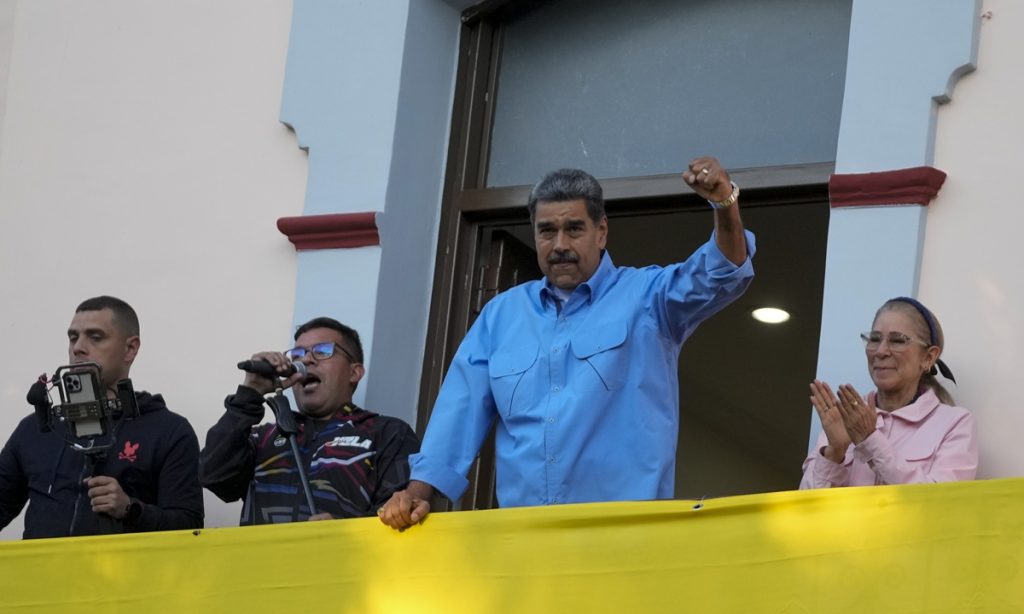Venezuela severs diplomatic ties with Peru, 'as political rift in Latin America deepens'

Venezuela has decided to sever diplomatic relations with Peru due to Peruvian Foreign Minister Javier Gonzalez-Olaechea's statement on the presidential election results in Venezuela, Venezuelan Foreign Minister Yvan Gil said on social media X late Tuesday local time.
"We are forced to make this decision after the reckless statements of the Peruvian foreign minister," Gil said on social media platform X, adding that the decision was made based on Article 45 of the Vienna Convention on Diplomatic Relations of 1961.
Before Venezuela's announcement, Peru on Monday refused to recognize the results of the Venezuelan presidential election and announced it had recalled its ambassador to Venezuela. In a post on X on the day, Peru's foreign minister slammed the result as "fraud," and a "violation of the will of Venezuelan people."
The presidential election of July 28 saw Nicolas Maduro secure a third term in office with 50.2 percent of the vote, according to the result presented by Venezuela's electoral council. Leader of the opposition Maria Corina Machado disavowed the results.
Before severing ties with Peru, the Venezuelan government on Monday announced the withdrawal of all diplomatic staff from the embassies of seven countries that questioned the election result - Argentina, Chile, Costa Rica, Peru, Panama, Dominican Republic and Uruguay, and also demanded those countries withdraw their diplomatic representatives from Venezuelan territory.
Meanwhile, Cuba, Honduras and Bolivia congratulated Maduro on his victory. China and Russia also congratulated Maduro on his re-election.
The presidential election is an extremely sensitive topic, and compared with other countries, Peru's questioning of Maduro's re-election is more straightforward and fiercer, which may be the reason for the severing of diplomatic relations between the two countries, said Wang Youming, director of the Institute of Developing Countries at the China Institute of International Studies in Beijing.
The election has sparked protests in Venezuela, with clashes reported between the police and opposition supporters, causing at least 11 deaths, injuries to 48 military and police officers, and hundreds of arrests, media reported.
Zhou Zhiwei, an expert on Latin American studies at the Chinese Academy of Social Sciences, said the controversy and chaos around Venezuela's election, both in the country and across the Latin America, reflects the sharp and intense political polarization of Latin American politics, despite the fact that left-wing governments are in power on a relatively broad scale.
"Not only in Venezuela's election, but also in other Latin American countries, the intensity of political power struggle between left and right wings is really high," Zhou said. "The elections in Brazil in 2022 and in Argentina in 2023 have both shown political rifts and a sense of tearing apart between factions."
According to Zhou, in such an environment of political confrontation, the cohesion of the whole region is weakened, and it is precisely an opportunity for external forces to play games.
US Secretary of State Anthony Blinken said on Monday that the US has "serious concerns" regarding Maduro's reelection. He called for election officials to publish the full results transparently and immediately.
On Tuesday local time, Venezuelan Defense Minister Vladimir Padrino Lopez denounced an alleged coup attempt that was instigated by the opposition and the US amid violent protests, according to media reports.
Over the past two decades, Latin America's joint development, regional integration, and diplomatic diversification have all advanced particularly quickly, coinciding with the "pink wave" of left-wing governance. But one of its spillover effects is to further weaken US hegemony and control in the region, Zhou said.
Washington is certainly attempting to pursue a political ecology that suits its own interests, so it will seek to support the moderate right wing, pro-market forces and pro-American forces throughout the region, he added.
"It does not rule out the option of the US to further expand sanctions against Venezuela, along with further diplomatic isolation and political repression," Wang said, adding that "the US is also very likely to continue to increase its support for the opposition, whether it is financial support, public opinion support and personnel training, all kinds of means of color revolution shall be used."
Wang said the chaotic situation is unlikely to end in the short term, and the unity of Venezuela and Latin America will be tested.